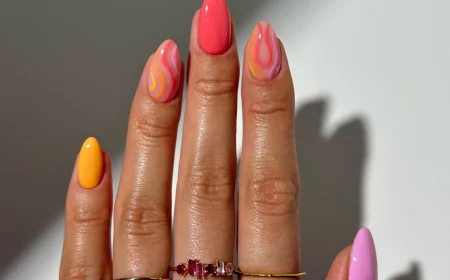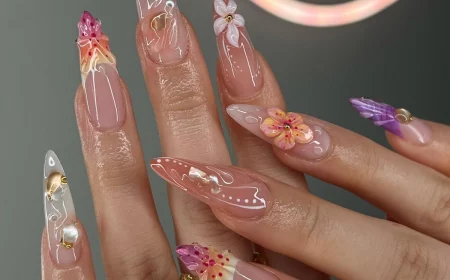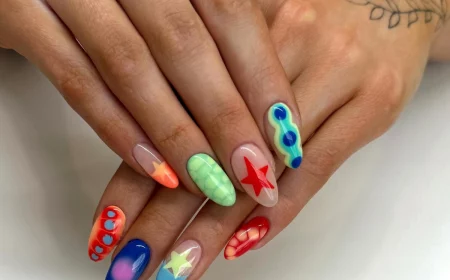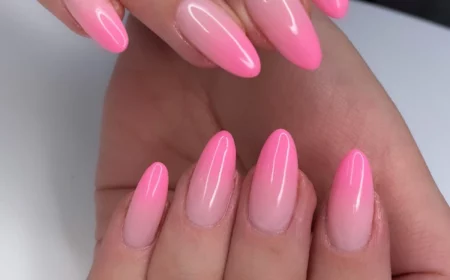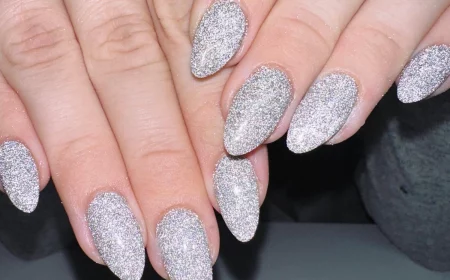Dip Nails vs. Acrylics: The Honest Guide to Choosing Your Perfect Manicure
Walk into any nail salon, and you’re faced with a big decision: dip powder or acrylics? As a nail tech who’s spent years behind the table, I get this question all day, every day. And honestly, there’s no single right answer. One isn’t magically “better” than the other. The perfect choice for you really boils down to your lifestyle, your nail goals, and the look you’re going for.
In this article
- What’s Actually in the Jar? A Quick Science Lesson
- Behind the Scenes: How a Pro Application Really Works
- Heads Up! Safety & Salon Red Flags
- The Nitty-Gritty: Cost, Durability, and Maintenance
- The Fun Part: Nail Art & Aesthetics
- Common Worry: “What If My Nails Are Already Damaged?”
- The Final Breakdown: Which One Is For You?
- Galerie d’inspiration
So, let’s skip the marketing fluff. I want to give you the real inside scoop—the kind of stuff we nail techs talk about amongst ourselves. We’ll get into what these products actually are, how they feel, what they cost, and how long you’ll be sitting in my chair. My goal? To arm you with enough knowledge so you can confidently choose what’s best for your hands.
What’s Actually in the Jar? A Quick Science Lesson
To really get it, you have to know what you’re putting on your nails. Both systems end up creating a hard, durable enhancement, but they get there in completely different ways. And that difference is key.

Traditional Acrylics: A Liquid + Powder Creation
Think of classic acrylics as a two-part magic trick. You have a liquid (the monomer) and a super-fine powder (the polymer). When I dip my brush in the liquid and then touch it to the powder, a chemical reaction kicks off right on the brush, forming a moldable little bead of acrylic. I then have a short window to press and sculpt this bead onto your nail to build the desired shape and length.
This process creates its own tiny bit of heat as it hardens in the open air—no lamps needed. The real skill is getting that liquid-to-powder ratio just right. Too wet and it’s a mess; too dry and it’s weak. It’s a true craft that takes a lot of practice to perfect.
Dip Powder: The Glue & Powder Method
Dip powder is often sold as a totally separate thing, but chemically, it’s basically a cousin to acrylic. The powder itself is a granular acrylic, but the application is what sets it apart. Instead of a monomer liquid, this system uses a series of special glues and an activator.

First, a base coat resin goes on. Fun fact: this is a cyanoacrylate resin, which is a type of medical-grade adhesive. Pretty wild, right? Then, your nail is dipped into the powder, which sticks to that resin. We repeat this a couple of times to build up strength. The final step is a chemical activator that’s brushed on top, instantly hardening all the layers. It’s way faster than acrylic curing and, big bonus, doesn’t have that signature strong smell.
Behind the Scenes: How a Pro Application Really Works
The final result has way more to do with the technician than the product. A proper, careful application is everything. Here’s a peek at what should be happening at your appointment.
Sculpting an Acrylic Set (Plan for 1.5 – 2 hours)
A full set of sculpted acrylics is an art form. It’s about building a strong, balanced structure, not just slapping on some length. After prepping your nails (the most important step!), we either apply a plastic tip or use a flexible form under your nail to build the extension from scratch. Using a form gives a more custom, natural-looking curve and is usually the pro’s preferred method.

Then comes the building. I place beads of acrylic strategically to create an apex—the highest, strongest point of the nail—that prevents breakage. Once cured, there’s a lot of filing and shaping, using a medium-grit file (like a 180-grit) and then finer buffers to get that perfectly smooth, sleek finish.
Layering a Dip Powder Manicure (Plan for 1 – 1.5 hours)
Dip is more of a systematic process, but it still needs a precise hand to avoid getting thick and bulky. After the same crucial nail prep, I apply a super-thin layer of the base resin. Then, I guide your finger into the powder at a 45-degree angle—plunging straight down can create a lump at the tip. Tap, tap, and brush off the excess. This is repeated 2-3 times, often in strategic layers to build a subtle apex without overwhelming the cuticle.
After the activator hardens everything, there’s still some shaping and buffing to do before the final shiny top coat is applied. It’s generally a quicker service from start to finish.

Heads Up! Safety & Salon Red Flags
Not all services are created equal, and you need to know what to watch out for to protect your nail health.
One major thing with acrylics is a chemical called MMA (Methyl Methacrylate). This is a cheap, industrial-grade monomer used in some discount salons that is NOT safe for nails. It’s incredibly rigid and bonds so aggressively that it can cause serious nail damage if you jam your finger. It also has a very strong, almost fruity chemical smell that’s much harsher than the standard EMA (Ethyl Methacrylate) used in professional salons. If a salon’s prices are unbelievably low and the smell is overwhelming, that’s a huge red flag. Walk away.
For dip powder, the big issue is hygiene. The old method of having every client dip their fingers into the same community pot of powder is a major sanitation no-no. It’s an open invitation for bacteria. The safe, professional way is the pour-over method. Your tech should portion out powder just for you and sprinkle it over your nail. Any leftover powder is thrown away. If you see them going for a shared jar, ask them about their process or find a different salon.

The Nitty-Gritty: Cost, Durability, and Maintenance
Okay, let’s talk about the practical stuff. Both systems are tough, but they feel and wear a bit differently.
When it comes to feel, acrylics are rock-solid and rigid. Dip nails tend to have a little more flexibility and can feel thinner and lighter on the nail for some people. This flexibility can make them more resilient to minor bumps. For clients who are really hard on their hands, like bartenders or nurses, dip holds up beautifully.
But for those who want serious length—we’re talking long stilettos or coffin shapes—I always recommend sculpted acrylics. That rigidity is actually a good thing here, providing the architectural strength needed to keep those long extensions from snapping.
Let’s Talk Money & Upkeep:
- Acrylics: Expect to pay anywhere from $65 to $150+ for a quality full set, depending on your location and the tech’s skill level. The real advantage is the maintenance. Every 2-3 weeks, you’ll come in for a “fill” or “rebalance” (around $45-$80+), where we just fill in the growth gap. We don’t have to soak off the whole nail every time.
- Dip Powder: A dip manicure is often a bit cheaper upfront, typically in the $50 to $80 range. However, you usually don’t “fill” dip. Most salons will do a full soak-off removal and apply a brand-new set at every appointment. So, while one visit might be less, the long-term cost can end up being pretty similar to maintaining acrylics.

The Fun Part: Nail Art & Aesthetics
Your choice might just come down to the kind of art you love. Acrylic is the undisputed champ for complex designs. Because it’s moldable, we can embed glitter, foils, and even tiny dried flowers right into the nail—this is called “encapsulation.” It’s also the go-to for sharp French manicure lines and cool 3D art.
Dip, on the other hand, is fantastic for its huge range of opaque colors and glitters. You can get a perfect, durable, single-color manicure that lasts for weeks. It’s also great for ombré effects. Any detailed line work, though, is usually painted with gel polish on top of the finished dip nail, not built within it.
Common Worry: “What If My Nails Are Already Damaged?”
This is a great question. If your nails are feeling thin, weak, or brittle, my best advice is to take a little break from enhancements. Piling more product on a weak foundation isn’t the answer. Focus on recovery! Get a good cuticle oil and use it religiously. Look for one with jojoba oil—its molecules are small enough to actually penetrate the nail plate and add flexibility. (A classic for a reason is the one from CND, SolarOil). In the meantime, a simple, gentle gel manicure can be a good way to have a little polish and protection while they heal.

The Final Breakdown: Which One Is For You?
Let’s make this simple. No tables, just the straight truth.
You might be an Acrylic person if…
- You dream of long, custom-sculpted stiletto or coffin nails.
- You love intricate, embedded nail art with glitter, foils, or 3D elements.
- You’re cool with visiting a skilled tech every 2-3 weeks for a fill appointment.
- You like the substantial, rock-solid feel of a sturdy nail enhancement.
You might be a Dip Powder person if…
- You want a super durable manicure in a solid color or glitter that feels a bit lighter.
- You are sensitive to the strong smell of acrylic monomer.
- You prefer a slightly faster service and don’t mind a full soak-off and new set each time.
- You have sensitive nail beds and want to avoid the e-filing that often comes with an acrylic fill.
Ultimately, the biggest decision isn’t dip vs. acrylic. It’s choosing a qualified, careful nail professional who puts your nail health first. A great tech can give you a gorgeous, long-lasting manicure with either system. Trust me on that.

Galerie d’inspiration


The Unsung Hero: Cuticle Oil. Your enhancements might be tough, but the skin around them needs love. Daily application of a quality cuticle oil, like CND SolarOil or OPI ProSpa, keeps your cuticles hydrated, prevents painful hangnails, and can even help your natural nail stay flexible underneath. It’s the single best habit for extending the life of your manicure and keeping your hands looking pristine.

Did you know? Acrylic nails were accidentally invented in 1954 by a dentist, Fred Slack, who was trying to repair his own broken fingernail using dental acrylics from his lab.

Fill or fresh set? What should I ask for?
A fill (or

Both dip and acrylic provide a perfect canvas for intricate nail art. Here are a couple of hot trends to ask for:
- The
That strong, distinct smell in a nail salon? It’s primarily from the ethyl methacrylate (EMA) monomer used in traditional acrylic liquid.
While it can be potent, this smell is a normal part of the chemical reaction that creates strong, durable acrylic nails. Modern salons combat this with excellent ventilation systems. Dip powder systems, on the other hand, are virtually odorless because they use resin-based glues instead of a monomer liquid. If you’re particularly sensitive to smells, dip might be a more pleasant sensory experience.
The allure of at-home dip and acrylic kits from brands like Azure Beauty or Modelones is strong, but proceed with caution. Professional application isn’t just about aesthetics; it’s about hygiene and nail health. A trained technician knows how to prep the nail correctly to prevent fungal infections, ensure the product doesn’t touch the skin (which can cause allergic reactions), and shape the enhancement for structural integrity. A poorly applied DIY nail is far more likely to break and damage your natural nail plate.
Matte Finish: Gives your nails a modern, velvety, non-reflective look. It can make dark colors look incredibly chic. However, it can be more prone to showing oils and stains from makeup or spices.
Glossy Finish: The classic, high-shine look that makes colors pop. It’s generally more durable and easier to wipe clean, keeping your manicure looking fresh for longer.
Pro-tip: A glossy top coat can often be applied over a matte one if you change your mind, but not the other way around!
- Wear gloves when doing dishes or cleaning with harsh chemicals.
- Treat your nails like jewels, not tools. Don’t use them to open cans or scrape labels.
- Avoid prolonged soaking in hot water, which can weaken the product’s bond.
- Never, ever pick or peel at lifting product; this can tear away layers of your natural nail.
The goal? Protect your investment and your nail health between salon visits.




